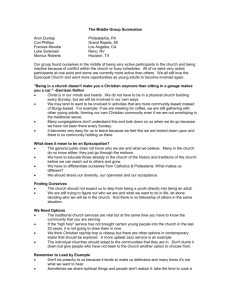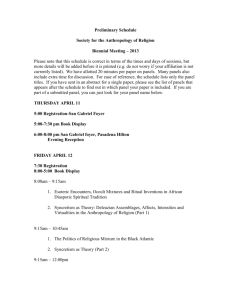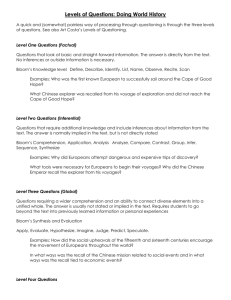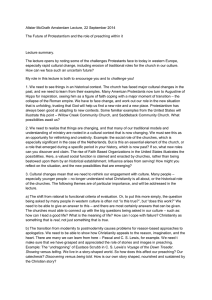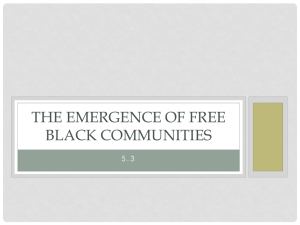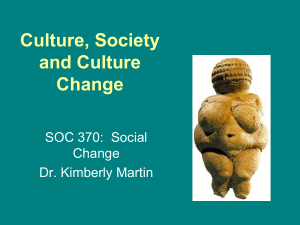Superstition and Syncretism
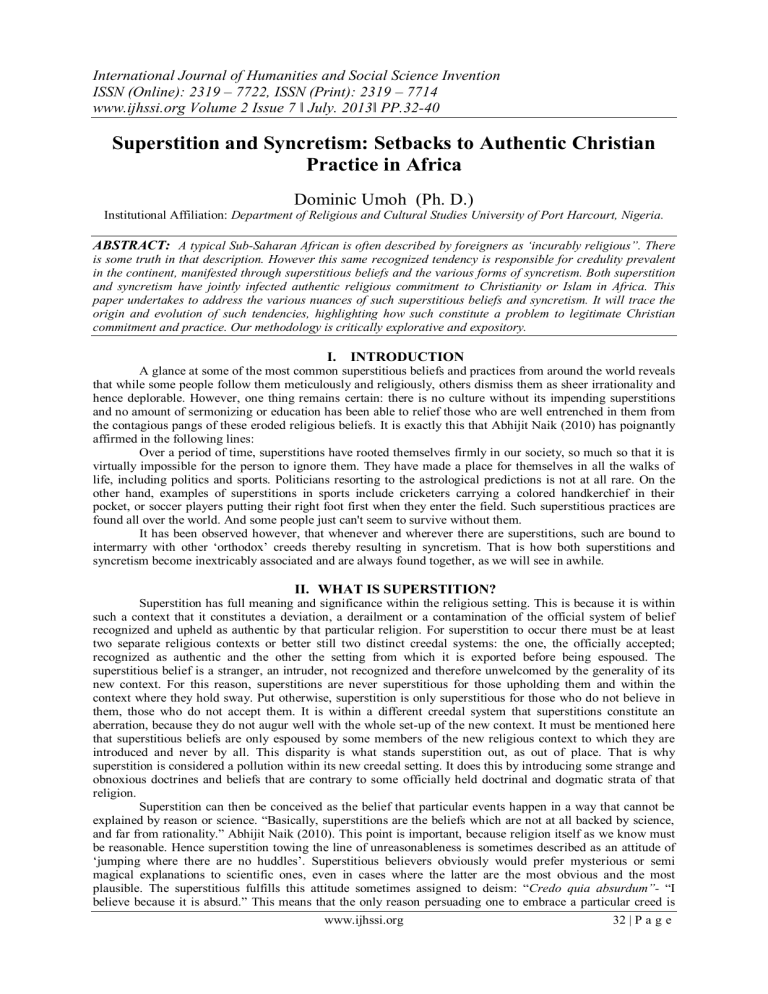
International Journal of Humanities and Social Science Invention
ISSN (Online): 2319 – 7722, ISSN (Print): 2319 – 7714 www.ijhssi.org Volume 2 Issue 7 ǁ July. 2013ǁ PP.32-40
Superstition and Syncretism: Setbacks to Authentic Christian
Practice in Africa
Dominic Umoh (Ph. D.)
Institutional Affiliation: Department of Religious and Cultural Studies University of Port Harcourt, Nigeria.
ABSTRACT:
A typical Sub-Saharan African is often described by foreigners as ‘incurably religious”. There is some truth in that description. However this same recognized tendency is responsible for credulity prevalent in the continent, manifested through superstitious beliefs and the various forms of syncretism. Both superstition and syncretism have jointly infected authentic religious commitment to Christianity or Islam in Africa. This paper undertakes to address the various nuances of such superstitious beliefs and syncretism. It will trace the origin and evolution of such tendencies, highlighting how such constitute a problem to legitimate Christian commitment and practice. Our methodology is critically explorative and expository.
I.
INTRODUCTION
A glance at some of the most common superstitious beliefs and practices from around the world reveals that while some people follow them meticulously and religiously, others dismiss them as sheer irrationality and hence deplorable. However, one thing remains certain: there is no culture without its impending superstitions and no amount of sermonizing or education has been able to relief those who are well entrenched in them from the contagious pangs of these eroded religious beliefs. It is exactly this that Abhijit Naik (2010) has poignantly affirmed in the following lines:
Over a period of time, superstitions have rooted themselves firmly in our society, so much so that it is virtually impossible for the person to ignore them. They have made a place for themselves in all the walks of life, including politics and sports. Politicians resorting to the astrological predictions is not at all rare. On the other hand, examples of superstitions in sports include cricketers carrying a colored handkerchief in their pocket, or soccer players putting their right foot first when they enter the field. Such superstitious practices are found all over the world. And some people just can't seem to survive without them.
It has been observed however, that whenever and wherever there are superstitions, such are bound to intermarry with other „orthodox‟ creeds thereby resulting in syncretism. That is how both superstitions and syncretism become inextricably associated and are always found together, as we will see in awhile.
II.
WHAT IS SUPERSTITION?
Superstition has full meaning and significance within the religious setting. This is because it is within such a context that it constitutes a deviation, a derailment or a contamination of the official system of belief recognized and upheld as authentic by that particular religion. For superstition to occur there must be at least two separate religious contexts or better still two distinct creedal systems: the one, the officially accepted; recognized as authentic and the other the setting from which it is exported before being espoused. The superstitious belief is a stranger, an intruder, not recognized and therefore unwelcomed by the generality of its new context. For this reason, superstitions are never superstitious for those upholding them and within the context where they hold sway. Put otherwise, superstition is only superstitious for those who do not believe in them, those who do not accept them. It is within a different creedal system that superstitions constitute an aberration, because they do not augur well with the whole set-up of the new context. It must be mentioned here that superstitious beliefs are only espoused by some members of the new religious context to which they are introduced and never by all. This disparity is what stands superstition out, as out of place. That is why superstition is considered a pollution within its new creedal setting. It does this by introducing some strange and obnoxious doctrines and beliefs that are contrary to some officially held doctrinal and dogmatic strata of that religion.
Superstition can then be conceived as the belief that particular events happen in a way that cannot be explained by reason or science. “Basically, superstitions are the beliefs which are not at all backed by science, and far from rationality.” Abhijit Naik (2010). This point is important, because religion itself as we know must be reasonable. Hence superstition towing the line of unreasonableness is sometimes described as an attitude of
„jumping where there are no huddles‟. Superstitious believers obviously would prefer mysterious or semi magical explanations to scientific ones, even in cases where the latter are the most obvious and the most plausible. The superstitious fulfills this attitude sometimes assigned to deism: “ Credo quia absurdum” “I believe because it is absurd.” This means that the only reason persuading one to embrace a particular creed is www.ijhssi.org 32 | P a g e
Superstition and Syncretism: Setbacks to Authentic… because the said creed is far from being clear and meaningful. It is absurd; meaning that it is opaque to reason.
In a sense, the superstitious gives in not because of conviction, but because he has no choice since the issue is beyond the explanatory aptitude of reason. As Umoh observes, this involves trusting the truth of something simply because it cannot be rationally or empirically supported.
This type of evaluation (superstitious) augurs badly with religious faith. For as the saying goes, “only a believer can see a black thread in the dark.” For people who buy such opinion, faith is darkness while knowledge is light. Implied in this statement is that there is not an iota of rationality when it comes to issues of religious belief. Faith, therefore according to this frame of mind, would imply a coronation of the illogical – the absurd; the defeat of the intellect, leading to the embrace of the absurd as the only alternative: Credo quia absurdum est. (2008: 107)
Throwing more light on the above adage, “ credo quia absurdum est, ” would expose the precarious situation of the superstitious. For him, reason has to be relegated to the background in its act of intellection because it is powerless before the immense mystery surrounding the divine-human relationship in the world and so can no longer pursue its quest. As a result, reason must shy away; it must surrender to faith, the principle of intellectual failure, for reason would not want to meddle with the „absurd‟ – the intellectually unclear. Whenever and wherever a particular „faith‟ fits the above description, the religious theory called fideism or credulity is inevitable. This is because following R. Smart “fideism is a view that our knowledge of religious reality is not, cannot be and ought not to be based upon rational or natural evidence, but solely on faith.” (170). According to
Karl Rahner et al superstition is an irrational cult of God appearing in a pattern unworthy of God, expressing confidence in formulae and rites which attempt to force God‟s assistance in order to predict the future. As such, it is a semi-religious veneration of real or imaginary powers in the place of God. (458). Most often, superstitions constitute a form of degeneration of religion. It involves practices of dubious value and dubious authenticity, by means of which practitioners may make their living. It may involve the manufacture and sales of various items claimed to possess infused spiritual powers. But in reality it is a misplaced or confused value. That is why, as
Naik (2010) states below, it is only accepted by the credulous or the gullible.
Basically, these beliefs and practices are illogical assumptions based on one particular incident, and followed by the gullible. For instance a cricketer who casually carried a red handkerchief in his pocket and played a magnificent innings that day is bound to believe that the good luck was brought upon him by this very handkerchief, and therefore carry it in his pocket every time he goes out to bat .
Ancient Romans identified superstition with all forms of exaggerated or extravagant religion. Christian theology recognizes in it, the fact of attaching a religious significance to what should not or in fact does not merit such a regard. It then warns that Christians should beware because superstition leads to a veritable degeneration of piety which may appear externally the most correct Bouyer (610). A superstitious person considers the world as shrouded in unexplainable or impenetrable mysteries. For instance in African worldview, it is believed that ghosts and spirits share the universe with humans and therefore keep tormenting them at will with unexplainable though irksome experiences. Most events, even those with possible ordinary rational explanations with no mysterious nuances, are attributed to spiritual demonic forces or ghosts. If someone slums and dies of heart attack he would be said to have been knocked off by a ghost, even if medical findings from autopsy proves the contrary. If the roof of this building caves in, an enemy would take the blame instead of the architect. That was exactly the issue I raised in my paper: “Death is not Natural: the African Story,” critically exploring and deploring the wrong attitude of Africans towards death. According to the African viewpoint, people do not die; they are killed. Umoh (2012:1-13)
Superstition is an archaic manner of viewing the universe and of interpreting its occurrences. It is prescientific, unscientific and anti-scientific in character. This is because the world of strict and universal laws discovered by science since its inception in the seventeenth century has no place for the capricious interference of the supernatural in natural events. The world portrayed by science is no longer the haunting-pitch of alien spirits, but a system of components operating in accordance with ineluctable laws of mechanics. It is no longer a vision of the planet governed and controlled by ghosts and spirits; instead it is a universe governed by scientific laws accessible to and controllable by the scientific community. And that is the world we religious men and women find ourselves today. Hence a superstitious believer today is eager, anxious and fearful of occult forces believed to be constantly menacing the universe. That is why superstitious believers are immersed in a religion of fear and inauthentic faith.
III.
SUPERSTITIOUS BELIEFS IN PRACTICE
Abhijit Naik (2010) has made reference to a certain superstitious practice that I believe exists in all cultures. Every time you sneeze, someone around you utters 'God bless' or „ gesundheit ‟ in German, meaning
„good health‟ or as among the Annangs south-south of Nigeria: “Nwaña Nsa oh!” meaning „may God forbid‟ death. This common incident, irrespective of which region one finds oneself started in the 16th century in
Europe, wherein it was believed the person throws the evil spirits within his body out whenever he sneezes. www.ijhssi.org 33 | P a g e
Superstition and Syncretism: Setbacks to Authentic…
“Most of these superstitious beliefs are backed by some illogical knowledge, and spread by gullible people,” says Naik.
The Al Jazeera television network had an emission showing a documentary of extremely brutal acts, believed to be an outcome of superstitious belief in Tanzania. A certain Dr. Leonard Kubi was shown occupied with the rescue of seriously mutilated albinos, whose body parts, mostly arms, were chopped off and sold to witch doctors for superstitious rituals. According to a popular and longstanding superstitious belief in the region, body parts of young albinos are used by witch doctors for rituals meant to bring prosperity and good fortune.
That led to a frantic hunt for albinos for parts; in fact but for the quick intervention of the government, albinos were fast becoming endangered species. An arrested witch doctor equally confessed that about half the population of prophets and pastors in the area consulted him to obtain powers for their various church ministries. From this, one can see how superstitious beliefs flow very naturally into syncretism. Al Jazeera, 1 st
September, 2012.
There are stories of people scavenging for used menstrual sanitary pads in Nigeria for ritual purposes.
This is another event resulting from superstitious belief in the efficaciousness of menses in traditional rituals.
The fact reported here below by Henry Umahi in one of the Nigerian dailies says it all.
Are you a woman, who disposes her menstrual pads in the garbage bin? You could be a victim of ritualists scavenging for such things. Investigations have revealed that ritualists are on the prowl looking for women‟s sanitary pads. A female student in girls‟ special science school in the South East told our reporter that scavengers of sanitary pads were caught in the hostel dumpsite while gathering sanitary pads. According to her, two ladies were caught with a bag of used menstrual pads at the hostel dumpsite. (5)
Among the Annangs of southern Nigeria, traditional herbalists and doctors well talented in their trade must demand items for sacrifice in addition to medical bills. Such could be live animals - goat, tortoise, or fowl.
For them this would constitute a seal of authentication of their talents. Their practice is therefore more of physical healing achieved through spiritual means than Western medicine. That is why all traditional doctors in the region were equally priests. This is also an indication that traditional medicine is not scientific but cultic.
Such a tendency is a return to the total mix-up prevalent in the past when every type of knowledge was either religion or nothing. But as we know, Greek philosophy had already dealt a fatal blow to that tendency of dumping all forms of knowledge together, by assigning different departments to different bodies of wisdom.
In the same region of Annangland, one wishing to be enlisted as a member of a hunting expedition group has to be ceremonially and ritually initiated. Though apparently not a religious group, hunters must offer sacrifices in order to get protected against the spirits of their slaughtered booties. They have their norms and regulations which are cultic in nature and therefore known only to initiated members. One of such norms is that no hunter should be called by name during any their game as such would reveal the true identity of the individual. Such would expose the lives of colleagues to danger as the spirits of slaughtered animals can haunt those whose true identities are known. This is an offshoot of the traditional belief among the Annangs, highlighted by Umoh (2009:71) contending that one‟s entire personal identity and destiny are contained in one‟s name. Anyone who knows my name has me at his beck; he can do anything he wants with my person, for my name is my personhood. The background to the above hunting norm is also the belief among the Annangs that animals have souls or constitute habitats as it were, for man‟s second soul called the „bush soul‟. Therefore before entering the bush for their expedition, hunters must line up at the edge of the road for a brief prayer, each carrying a handful of sand. Then at a signal they would intone this incantation together: “All you evil forces in the bush, we command you: quit the bush as we enter and re-enter as soon as we depart.” At the end of this short ritual, they would all throw the sand into the bush in unison before penetrating into the dark green vegetations of the tropics. Here one can see an ordinary hunting hobby blended with religion and fear – evidence that superstition always gives rise to syncretism.
In other parts of Nigeria, there is a practice similar to that of cricketers carrying coloured handkerchief in their pocket. It concerns a superstitious belief prevalent also in many other parts of Africa, concerning palm fronds. Palm fronds are believed to ward off evils and to keep evil spirits at bare. Umoh, quoting Wvenagha has this to say:
In this respect, they (palm fronds) have protective powers. Hence whoever or whatever is transporting corpses, which are believed to attract all sorts of spirit, had to be protected with yellow palms. This practice still lingers on today in most parts of Nigeria as vehicles carrying human remains are protected with palm fronds.
This is also meant to signify the sacredness of death. (2007:8).
Recently, there was a row at an airport between some relatives and the crew members of a certain airline transporting the remains of their dear one to Nigeria from abroad. The family, not being contented with attaching palm fronds to the coffin, attempted to attach some to the wings of the aircraft transporting the remains in order to protect the plane against ghosts and other evil forces in mid air. This would ensure the plane against being brought down by malevolent spirits attracted by the corpse. This was really pure syncretism; the peak of a www.ijhssi.org 34 | P a g e
Superstition and Syncretism: Setbacks to Authentic… crash of two cultures: the scientific and the traditional, pre-scientific and superstitious cultures. The above in effect shows that the superstitious is really a rotten apple in the religious barrel.
IV.
SYNCRETISM
L. Bouyer (614) derives „syncretism‟ from the Greek etymology synkratein , meaning «pouring together». It is like pouring one type of liquid into another; for instance water into wine, and thereby obtaining a totally different substance which is neither purely water nor purely unadulterated or undiluted wine. From this etymological meaning, syncretism designated “a system or rather a tendency of Hellenistic thought which tended to mix and to confuse most diversified cults”. It is “a fusion of rituals and doctrines”. The concept finds place in almost all modern religions as syncretism is a “blending,” a tampering, a mixing together, and a
“bringing together of conflicting ideologies into a unity of thought and/or into a cooperating, harmonious social relationship.” Angeles (286).
The word syncretism is used to refer to the practice of harmonizing two or more distinct sets of beliefs to create an entirely new one. Syncretism normally refers to merging beliefs of two or more religious systems in order to come up with a new one, which sometimes demonstrates the traits of the systems involved. This may also include the fusion of two contradictory schools of thought. From the sociological point of view, syncretism is necessary for the smooth functioning of a society with different backgrounds, as its absence can disturb the balance of such a society. The fact that this concept can bring together two contradictory thoughts may sound confusing and rightly so. However, that is a fact.
Syncretism is predominant when it comes to religions and cultures. As far as religion is concerned, it is a well-known fact that most of the modern religions evolved from various ancients beliefs; hence the tendency to carry-over and blend with the former creedal milieu. From the religious perspective then, it is in this blending that is found the adulterating character of syncretism. This makes syncretism an inauthentic tenet gotten by combining bits of various creeds, ideologies and views – even contradictory ones – resulting in a formulation of a doctrine that is completely new and sometimes unidentifiable with any of its original stuffs. Such an espousing is far beyond the scope and in fact a deviation from the target of enculturation, which for African Christians involves embracing the Christian message in an African manner. (Umoh 2012:5)
The scenario quoted here below by Ejizu from Albert K. Obiefuna about the Igbos of Nigeria, converted to Catholicism, can conveniently be applied to most sub-Saharan African converts. According to
Obiefuna, there is no gainsaying the giant strides made by Christianity in Africa. But most of these Christians are indulged in beliefs which are tainted with superstitions and syncretism.
Thousands come to our churches. Our cathedrals and chapels are filled to capacity every Sunday and during important celebrations like harvest and bazaars. A lot of people also make huge donations for the upkeep of the church. Still many also avail themselves of the Sacraments…. But often, there are reports that practicing
Christians are equally idol worshippers. They swear on idols, erect hidden shrines in their homes. They hide fetishes in their shades in the market stalls and in their workshops. “Catechists, Seminarians on apostolic work in the towns and villages are stunned at the degree of idol worship and superstitious practices that still exist among a people that are mostly baptized Catholics.”
In turn, Ehusani has also this all-important contribution to make, namely that Christian faith in Africa has suffered a terrible ambivalence in the hand of syncretism. This is because the external religious observances of Christians do not match the disparate deeply rooted traditional beliefs of typical Africans.
Majority of African Christians live ambivalent spiritual lives; with an exterior allegiance to the God of
Jesus Christ, but with an interior and perhaps a more profound allegiance to the God of their forbears who has refused to give way to the new God. There is a wide gap, a split, or is it a dislocation, of many Africans recently converted to Christianity, and this phenomenon cries out for attention. So soon after the “implanting” of
Christianity in Africa, and just as the foreign missionaries are arriving home and congratulating themselves on the success of their proselytizing missions, “the love of many has gone cold.” (159).
Ejizu in his turn decries this degradation in Christian values among Africans resulting from syncretism.
He observes that at every retreat, Catholics (Christians) bring out from their homes fetishes and charms of all types. According to him, idol worship, superstitious practices, fear of witchcraft, charms, and all sorts of vain observances are realities prevalent among our Catholics. This in effect attests beyond doubt to the fact that the indigenous religions remain very much the living faith of many African converts. They are mixed with newly embraced faiths. As a former missionary to West Africa, Lee Hegeman affirms, only one out of ten self-named
Christians in this region practices true Christianity. Syncretism is therefore well imbedded in Africa. Hence
Umoh (2012a) affirms: “Our religious inclination in this country is very syncretistic.” (90).
Some people call it syncretism, but it may be more like dual religious allegiance, where Christianity is practiced in the daytime and occult [practice] is done at night. Many of the pastors will preach from the pulpit that this type of thing is wrong, but secretly take part in it at night. There is the mentality, especially in African
Initiated Churches, where the prosperity gospel is preached, that you do what you‟ve got to do to get ahead. You www.ijhssi.org 35 | P a g e
Superstition and Syncretism: Setbacks to Authentic… rely on the powers available to you. You are hopeful that Christ will help, but when he can‟t come through on
Sunday, you may take out a different insurance policy at night.” frjody.com/tag/superstition
This new type of „insurance policy‟ amounting to syncretism is very rampant nowadays and very much behind the story below. Not long ago, Aloysius Attah, reported that a self-proclaimed prophet in Nsukka Local
Government Area of Enugu State, Nigeria was pulling the crowd to his newly founded church. His immense achievements were attributed to superstition and syncretism . He held vigils practically every night and people overcrowded his centre because of “mind-blowing testimonies” from those who had visited him previously. To attract new followers and to keep old ones, the prophet had to blend rites, rituals and symbols from several sources: many the mainline churches, sects and traditional religions. He used some religious items that his neophytes were familiar with in their former respective churches: such as oils, incense, crucifix, and of course the bible. He adapted his prayers, and rituals to suit as many participants as possible in his arena.
Things assumed a dangerous dimension when the prophet allegedly applied some Catholic doctrines in his prayers apparently to attract more people. He began his prayers with the sign of the cross, while the rosary was also said in every gathering. However, the style of his vision brought confusion among people, enthroning rancour, and mutual suspicion. People began to see their brothers as the source of their problems, while some who visited the prophet insisted that the names of their enemies should be revealed to them. Ik-Priests-
Forum@yahoogroups.com (2011).
From the above, syncretism cannot but be evident and I am persuaded to agree with Nnamani (2003) that “All the separatist churches – even the African sections of the mission churches – are syncretistic. All their
Christian ideas are edited by the religious ideas they bring with them from their cultural upbringing.” (94). This observation tarries with the following by J. Omoregbe that African religion is still very much a living religion blended with Christianity and Islam by a vast majority on the continent and thereby giving vent to syncretism:
Even among those Africans who have been converted to Christianity or Islam, very many have not really abandoned their indigenous religion completely. In times of difficulties or dire need they go back to their roots – to their indigenous religion. Indeed, very many African Christians and Muslims have continued with the practice of their indigenous religion along with Christianity or Islam as the case may be, which means that their
“conversion” from African indigenous Religion to Christianity or Islam was never total. (63)
In this light Umoh insists: “I can confidently affirm that the African type of Christianity is a thorough syncretism, because ideas indiscriminately taken from several sources are forced together and thereby producing strange doctrines, dogmas, philosophies or religion, which are neither traditionally African nor African
Christianity.” Umoh (2012:14). Ejizu is right in the explanation below:
The reason for the above is not at all far-fetched. As we all are aware, religious conversion is such a complex and fluid issue. This is particularly true in Africa; with the persistence of vital beliefs among many converts to Christianity and the tremendous resilience and adaptability of their indigenous religions, it is extremely difficult to be categorical about the state of religious conversion of the majority of Africans. The astonishing stories of phenomenal achievements of the missionary religions and of heroic lives of faith by numerous converts to Christianity or Islam ought to be taken together with the constant complaints against shallowness of faith, nominal membership, syncretistic practices among a large segment of the population of new converts. www.afrikaworld.net/afre/conversion.htm
The impact of Western civilization in this regard is not overwhelming, because it has not succeeded to produce pure and authentic African Christians or Muslims totally liberated from the various forms of superstitious beliefs they bring with them into their new faith.
When one sees an African professor of nuclear physics standing naked at a road junction in the midnight and pulling off the head of a living chicken while making some incantations to the evil spirits or when one considers the number of Christians seeking exorcism from numerous healers in modern African communities, one would not need to be told again that science has not succeeded in dealing a fatal blow to the belief in demons. (Nnamani: 88)
In another development I still remember vividly a serious scandal that broke up some years ago in a small village of Inen, in the southern part of Nigeria. It concerned this same phenomenon, syncretism. Much to the surprise of all villagers, an apparently very faithful Christian was caught in the very act of fetching sand from a fresh grave of a young man. The sand was for a ritual currently termed “assignment” in some religious quarters. Various unusual, controversial and often unchristian “assignments” are prescribed to members by some modern charismatic movements not only within the new African initiated churches, but even in some mainline churches. Fetching the red earth from new graves for certain rituals among members of the group is just one of such. The main controversy in the above case was that traditionally anyone found roaming about a new grave was a suspect; his presence there was to celebrate the death of the victim and such was held responsible for the demise. Traditionally, this was a very serious matter for villagers. The cause of the scandal in the above particular case was the fact that the person involved was a practicing Christian. That „assignment‟ is a very clear www.ijhssi.org 36 | P a g e
Superstition and Syncretism: Setbacks to Authentic… case of superstition and syncretism, a confused doctrine cross-pollinating two totally different realms of doctrinal beliefs.
V.
AFRICAN INITIATED CHURCHES AND PENTECOSTALISM
Syncretism can be regarded as a religious prostitution. It has found a fertile ground with the current new religious movements and Pentecostals in African Initiated churches. With such movements syncretism is spreading like wild fire throughout the continent. Having detached themselves from the mainline churches, these modern sects have been turned into private businesses by their founders and pastors. With the proliferation, the founders have to cope with challenges, competitions and struggle for customers in the religious world market.
They are therefore obliged to advertise their goods befittingly, attempt to outwit other competitors by attracting and keeping as many clients as possible. They scramble for members by all means; that is by preaching only what they would want to hear. Concerning this last, the most often referred to is miracles in connection with wealth, health, power, material well being, including success in marriage, long life, prosperity, breaking of agelong curses and family woes, destruction of one‟s enemies, especially witches. These days, no mention is ever made of heaven and hell. Heaven is either materially here or nowhere.
The proliferation of new religious movements, sects and independent churches in Africa in general and
Nigeria in particular is a fact that cannot escape the notice of any newcomer to the continent. In Nigeria for example, everywhere is converted to a makeshift place of worship.
In the little town of Abak in Akwa Ibom State, for example, there are several hundreds of them (sects).
Although the population of the area is not more than 6ooo inhabitants yet the town could rightly be referred to as the seed bed or harbinger of all types of erratic religious movements. Literally, all the classrooms in primary schools, open spaces in the filing stations, some lockup stores, public buildings, bus stops, mechanic shades, drinking parlours and, in some cases, even parlours or rooms of private houses, etc have been turned into churches, especially on Sundays. Udoette, (36)
The peculiar way in which these New Religious Movements contribute to superstition and syncretism is fascinating. Motivating factors resulting in the proliferation of New Religious Movements and subsequently in the increase in syncretism are multifarious. However, the one that concerns our paper most is the failure by missionaries of the orthodox mainstream churches to meet the spiritual needs of Africans within their cultural context and ambient. The early Christian missionaries never took African cosmology and world view into consideration while evangelizing. Here I totally agree with Kofi Appiah-Kubi (1991:148) that the impact of
Christian faith in Africa should be received with mixed feelings. This is because on the one hand Christianity has opened up the continent to the rest of the world in terms of Western education and civilization. But on the other, the innovation was brought into the continent with no regard for the African world view and custom.
Innovators considered Africa a tabula rasa - a blank slate – on which just anything could be documented. The outcome was disastrous: poor quality of Christian discipleship and widespread crises of commitment among peoples. Further consequences reveal that the innovators hatched out half-baked Christians who are neither truly the foreign Christians according to their predetermined scheme nor totally their former African pagans, as they were usually called. This last says it all about the agony of the black African continent. It is “the agony of constantly being described by visitors in our land as being an incurably religious people and yet as pagans.”
Kofi Appiah Kubi, (167). Hence there is need for proper enculturation, poignantly described here by Udoette as:
…a serious search on the part of Africans to accept Christianity and at the same time maintain their identity as Africans… the need to attain to spiritual fulfillment without having to become white men....an attempt to strip Christianity of its foreign cloak and make it meaningful and fulfilling to African in their sociocultural milieu. This means that Africans are not at home with any kind of Christianity that does not come to grip with African life and problems. Udoette (38)
It is in attempting to make for this necessity that the mushroom churches, as they are sometimes called, go beyond the search for cultural identity or enculturation to adulterate the very essence of the Christian message by embellishing it with superstitious and syncretistic doctrines. This is done in a bit to attract clients. It must be borne in mind that most of the founders of these movements broke off from the mainstream Christian churches to establish their own. They deserted for several reasons. At times it was due to some disagreement in matters of doctrines, leadership or finance. This last, the economic reason, seems to constitute the main reason for the endless proliferation of nascent Christian churches in Africa. This is because most of the New Religious
Movements have been established for purely economic reasons. This is implied in this remark by Udoette:
“Many Nigerians have come to see religion as a means of making profit and getting rich quickly. Attendant upon this development is the wide range of deceits and falsehood that self-made and self-acclaimed pastors sell out to the religiously scrupulous Nigerians.” (38). Precisely this is what Obiora means in the lines below:
Along the line of the soul-winning mission cum supremacy struggle, the issues have gone beyond the urge to spread pure faith. Political and socio-economic considerations have all too frequently been the major reasons for the churches proliferation that have received religious colouration in order to bring them to the fore. www.ijhssi.org 37 | P a g e
Superstition and Syncretism: Setbacks to Authentic…
They do these, because, they believe their last hope is in religion, not in hope of salvation, heaven or hell, but the hope of acquiring material wealth by capitalising on the „crass ignorance‟ of the people. Obiora (1).
These new era preachers adopt many strategies and tactics to outwit their rivals. They excite, attract and draw their clientele mainly from among the youth and the middle-aged, both employed and unemployed; for the unemployed to help them secure employment in Jesus‟ name and for the employed to enable them to find promotion in Jesus‟ mighty name – all these in materialistic terms. This is syncretism tainting the message of the gospel with materialism. The founders/leaders are usually charismatic individuals, literate, and often loud and flamboyant in their life-style. They adopt very modem methods of preaching employing electronic gadgets and modern music. Their overall bearing in life is generally Western-oriented. Some of them employ all kinds of modem means of promotional advertisement to propagate their message.
With all these, the corruption of the message of Christianity cannot but be obvious; giving way to newly formulated superstitious doctrines to compliment whatever is retained of the original teachings of the mother mainline churches from where they emerged. Or as F. Obiora questions: “Why the multi-fission of churches? Are these churches not bringing out elements that are not in consonance and accordance with the orthodox ones? What new teachings have these new churches?”(7). They certainly make sure they deviate from some teachings of the mainline churches, especially those doctrines that were found burdensome to accept and what their neophytes would really want to hear. No preacher of these nascent churches preaches eternal life.
VI.
MATERIALISTIC SALVATION
One of the negative contributions of the current new religious movements to syncretism and superstition is the purely materialistic gospel preached by their men and women of God. Turning their churches which are already personal property, assets or estates, into commercial entities, founders do their utmost best to advertize their enterprises and goods in the most attractive and flamboyant fashion that today‟s world would want to hear. It is in this way that the authentic Christian message is lost sight of, jeopardized, diluted, polluted and blended with things that have absolutely nothing to do with the Christian vocation. As we know, syncretism is a misappropriation, and therefore an adulteration and a dilution of the dogmas, doctrines, decrees, tenets and the creedal system of a particular religion on modifying them for one‟s personal motives. In this sense the materialistic salvation and prosperity gospel in vogue today constitute a sharp and remarkable departure from the authenticity of the original creed of the mainline churches.
The above departure from the message of salvation characterizes the evangelization strategies of modern religious movements and nascent churches. Currently there is uproar about one of the multi-millionaire Nigerian pastors, Mr Oyedepo, dubbed “The Pastorpreneur” who is a popular preacher of the „prosperity gospel‟. He is not the only Nigerian pastor owning more than two private jets, but of late his prosperity gospel has fast become scandalous. Between 2007 and 2010 he received £794,000 or 73 per cent of the charitable donations paid out by the British Winners‟ Chapel. This was despite claims in Africa that he is enriching himself at the expense of his devotees.” He has a fleet of not less than four expensive aircrafts and his congregants are handed payment slips at every gathering requesting payments by cheque, cash or debit card when they enter London‟s Winners‟
Chapel. George Arbuthnott, Daily Mail , Wednesday, Oct 24 2012.
The reporter (above) saw a payment slip being given to every person entering the church encouraging them to donate money by cheque or cash or to fill in a form with their debit card details. The slip said tithes should be paid separately using a „Kingdom Investment Booklet‟ and the reporter was informed that payments could also be made by phone. A pastor told the worshippers: „You shall be financially promoted after this service in Jesus‟ name if you are ready to honour the Lord therefore with all your givings, tithes, your offerings, your kingdom investment, your sacrifices. Congregants were told to fill in their slips and hold them above their heads while the donations were blessed.
The above is, to say the least, the height of syncretism, mixing up the message of the Christian gospel with material wealth and twisting the Christian message to favour personal material gains. This turning of God‟s kingdom into a-money - gamble venture has become superstitious, especially when judged against the background of authentic Christian message still languishing within the orthodox Christian milieus. The Sunday
Mail also reports of a video footage of Mr Oyedepo striking a woman across the face and condemning her to hell after she had confessed of being a „witch for Jesus‟. This event is believed to have happened in the
Winners‟ Chapel Super church in Nigeria. In May 2012, the pastor was sued for ₤800,000 over the alleged assault. This is the type of shepherds we have today and condemned by Cardinal Anthony Okogie of Lagos
Archdiocese, for placing materialism over and above the Christian message. Among Mr Oyedepo‟s fleet of aircrafts are said to be a Gulfstream 1 and Gulfstream 4 private jets. It is also claimed that he and his wife, Faith, travel in expensive Jeeps, flanked by convoys of siren-blaring vehicles. He is the senior pastor of Faith
Tabernacle: a 50,000-seat auditorium in Lagos Nigeria, reputed to be the largest church in the world, and runs a publishing company that distributes books carrying his message across the world. His other business interests www.ijhssi.org 38 | P a g e
Superstition and Syncretism: Setbacks to Authentic… span manufacturing, petrol stations, bakeries, water purification factories, recruitment, a university, restaurants, supermarkets and real estate. The latest addition is a commercial airline named Dominion Airlines. http://www.dailymail.co.uk/news/article-2220833/Laughing-private-jet--93m-pastor-accusedexploiting-British-worshippers.html#ixzz2AEP4eI9P
Apart from Pastor Oyedepo, there are some other multi-millionaire pastors preoccupied with the personal wealth gospels in Nigeria. “Many other Nigerian pastors are similarly building multi-million dollar empires from their churches. Today, pastors fly around in private jets, drive fancy cars like Daimlers, Porsches and BMWs, don Rolexes and Patek Phillipes, and own breathtaking mansions all over the world.”
“Nigeria‟s Five Richest Pastors” http//news2.onlinenigeria.com
VII.
CONCLUDING EVALUATION
A brief tour of our topic has been accomplished. We have come to grip with the various nuances of superstition and syncretism and their menace to authentic Christian practice in Africa. We have touched on their origin in traditional beliefs and in the mainline churches. We have equally met the contributions made by the
New Religious Movement towards superstition and syncretism, especially as regards their materialistic gospel.
All these and a lot more have constituted a terrible baton in the wheels of authentic Christian practice.
The magnitude of the success of this devastation lies with the socio-economic backwardness of most
Africans. These vulnerable creatures become exploited in the very process of searching for the miracles of better material wellbeing and improved living conditions. As well observed by M. Bassey in Ukpong (2008): “This movement (Pentecostalism) especially, in the Nigerian context, is shown to have appealed to people‟s sense of insecurity, anguish and fear caused by crisis of values and identity in contemporary society and the concomitant ruthless struggle for survival.” (vii). The setup is so confusing that everybody, both the exploiters and the exploited have lost sight of the true message of the gospel. In today‟s churches, nobody thinks or talks about heaven. The entire Christian message today is on material success and security. The gospel message has become entirely mundane. But alas the spiritual was the core of the message of Christ to his early followers and
Christians today were to follow suit. Apart from poverty, most Africans are exploited, led astray and become gullible due to ignorance. They appear unwilling to be enlightened about basic facts of life. As Rudolf Okonkwo has correctly decried:
The tragedy of Africa is that it reached the information age without first passing through the industrial age. In matters temporal, Africa got to the modern age without passing through the Enlightenment. That is why some people believe that a child was born holding a mini-Koran in its hand, or that a child came out of the womb holding a cross in its hand. Why mini-Koran? Why a cross? Why something we already know? Why does this kind of phenomenon only happen in societies that wallow in superstition? If it is a message from God, as some believe, why won‟t God use the opportunity to send a definitive manual of life? ikforum@yahoogroups.com
Thus materialistic salvation preached by new religious movements and the whole spectrum of superstitious beliefs/syncretism highlighted above, violate this text of the book of Deuteronomy about the integrity of God‟s word: “Listen Israel: Add nothing to the commandment and decree that I give you; add nothing, subtract nothing.
” (Deut. 4:1-2; 6-8). The unalloyed message of Christianity has completely lost its purity directly or indirectly to superstition and syncretism. This is because “every word of God proves true; he is a shield to those who take refuge in him. Do not add to his words, or else he will rebuke you, and you will be found a liar.
‟ (Prov. 30:5-9). Preachers misappropriate, thwart and distort the essential message of Christianity adapting it for their own material profit. The big question is: where do we go from here?
[1].
[2].
[3].
[4].
[5].
[6].
[7].
[8].
[9].
[10].
[11].
[12].
WORKS CITED AND ENDNOTES
Abhijit Naik (2010) http://www.buzzle.com/articles/superstitious-beliefs.html
Angeles P. 1981 Dictionary of Philosophy (New York: Barnes and Noble Books).
Appiah-Kubi 1991 “Faith, Science and Technology: An African Perspective” in African Dlemma: A Cry for Life , Kubi K. et al
Eds. Papers presented at Ecumenical Association Third World Theologians (Eatwot) 148 (148-157).
Arbuthnott G. (2012) “Laughing on his private jet - the £93m pastor accused of exploiting British worshippers” Daily
Mail, Wednesday, 24 October 2012.
Attah A. 2012 “Unholy War: Prophet threatens to bomb catechist Ik-Priests-Forum@yahoogroups.com
Bouyer L. (1963) Dictionnaire Théologique (Tournai: Desclée)
Ducat P. and J. Montenot Ed. (2004) Philosophie, Le Manuel (Paris: Ellipes Édition marketing S. A. ).
Ehusani G. Commitment: “The African Dilemma” African Dlemma: A Cry for Life , Kubi K. et al Eds. A collection of papers presented at Ecumenical Association of Third World Theologians (Eatwot) 159-166.
Ejizu, C. I. (2012) “Conversion” In African Traditional Religions www.afrikaworld.net/afre/conversion.htm
Ejizu, C.I. (1984) "Continuity and Discontinuity in African Traditional Religion, The Case of the Igbo of Nigeria', Cahier
Des Religions Africaines, (Vol. 8, No. 36, 1984), pp. 197-214.
Lewis H. D.
(1959) Our Experience of God (London: Allen & Unwin). Naik A. (2010) www.buzzle.com/articles/syncretism-examples.html
www.ijhssi.org 39 | P a g e
[23].
[24].
[25].
[26].
[13].
[14].
[15].
[16].
[17].
[18].
[19].
[20].
[21].
[22].
Superstition and Syncretism: Setbacks to Authentic…
Nnamani, A. (2002) „Demonology and African experience‟ in Nacaths Journal of African Theology vol. 12.
Obiora F. (1998) The Divine Deceit (Enugu: Optimal International).
Okonkwo R. (2012) “My Religion is better than yours” ikforum@yahoogroups.com .
Omoregbe, J. (2009) Comparative Religions, Christianity and other World Religions in Dialogue (Lagos: Joja Press Ltd.)
Rahner K. et al (1970) Petit Dictionnaire de Théologie Catholique (Paris: Edition du Seuil)
Smart, R. (1959) Reason and Faith (London: SMC Press).
Udoette, D. (2002) “New religious Movements in Nigeria: Challenges to the Church in the New Millennium” The Search , vol. 1,
No. 1, 36-37 (35-48).
Ukpong, D. (2008) Nigerian Pentecostalism: Case, diagnosis and prescription (Uyo: Fruities‟ Publications).
Umahi H. 2012 “Ritualists feast on Used Sanitary Pads” Saturday Sun , December 15 2012.
Umoh D. (2007) Traditional Symbols enriching Christian Symbolism: the Yellow Palm of Palm Sunday (Abuja: Madol
Publishers).
Umoh D. (2008) “Philosophical Truth versus Religious Faith: a Phenomenological Critique” WAJOPS West African Journal of
Philosophical Studies , vol. 11, 105-128.
Umoh D. (2009) A Philosopher looks at Annang Personality (Enugu: Snaaps Publishers).
Umoh D. (2012)“Death is not Natural: The African Story” Journal of Religion & Society, The Kripke Center Vol. 2012. 1 - 13.
Umoh D. 2012(a) A Philosopher looks at Science, Religion and Secularism (Port Harcourt: University of Port Harcourt Press). www.ijhssi.org 40 | P a g e

